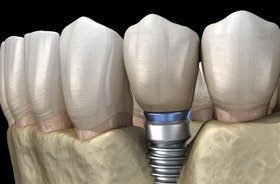
Dental Implant Failure & Salvage – Hamden, CT
Saving Your Restored Smile

Dental implants are almost always successful; research has shown that they commonly last for 10 years or longer without any problems. However, you should still be aware of the signs of a possible failed dental implant in Hamden. This problem could occur at any time, and the sooner you recognize it and seek treatment, the more likely it is that our team will be able to preserve your restored smile.
Why Do Dental Implants Fail?

Peri-implantitis, an infection of the tissue around a dental implant, is the most common cause of dental implant failure. It eats away at the gum and bone, eventually compromising the implant’s base of support. Missteps in oral hygiene are often the culprit behind peri-implantitis, but other factors can also play a role in its development.
Other potential causes of dental implant failure include:
- Unsuccessful osseointegration (the implant never bonds properly with the jawbone)
- Physical trauma
- A range of medical conditions, such as cancer or other problems that could interfere with the body’s ability to support dental implants in Hamden
Symptoms of Failed Dental Implants

There are two broad categories of dental implant failure. Early failure happens soon after the implants are surgically inserted into the jawbone. Late failure could occur at any time, even years or decades after the initial placement surgery.
Symptoms of both types of dental implant failure are similar and include things like:
- Extreme pain. Some discomfort is normal in the initial healing period following implant placement surgery. However, extreme pain, as well as pain that suddenly occurs after successful osseointegration, may indicate a problem.
- An implant feels loose. This could mean that your crown, bridge, or denture is damaged, or the problem could be related to the implant itself.
- Swelling, redness, or pus in the gum. These indicate a possible infection and call for a prompt professional care.
- Difficulty using your dental implants. After osseointegration, it should be easy to chew, bite, and speak with your implants. If it is not, it is possible that you are in danger of dental implant failure.
How Dental Implant Salvage Works

As soon as you suspect that something is not quite right with your dental implants, contact us. The earlier you seek care, the more likely it is that we will be able to save your restored smile without performing any extensive procedures. When you arrive come in for your appointment, we will thoroughly examine your mouth, perhaps take some X-Rays, and strive to pinpoint the cause of the problem. After we do that, we will recommend your next steps.
In some cases, we can solve a problem via conservative measures, such as a new restoration or a course of antibiotics. In other cases, however, we must remove a dental implant altogether. Later, after some restorative treatments and a healing period, we may be able to insert a new implant.